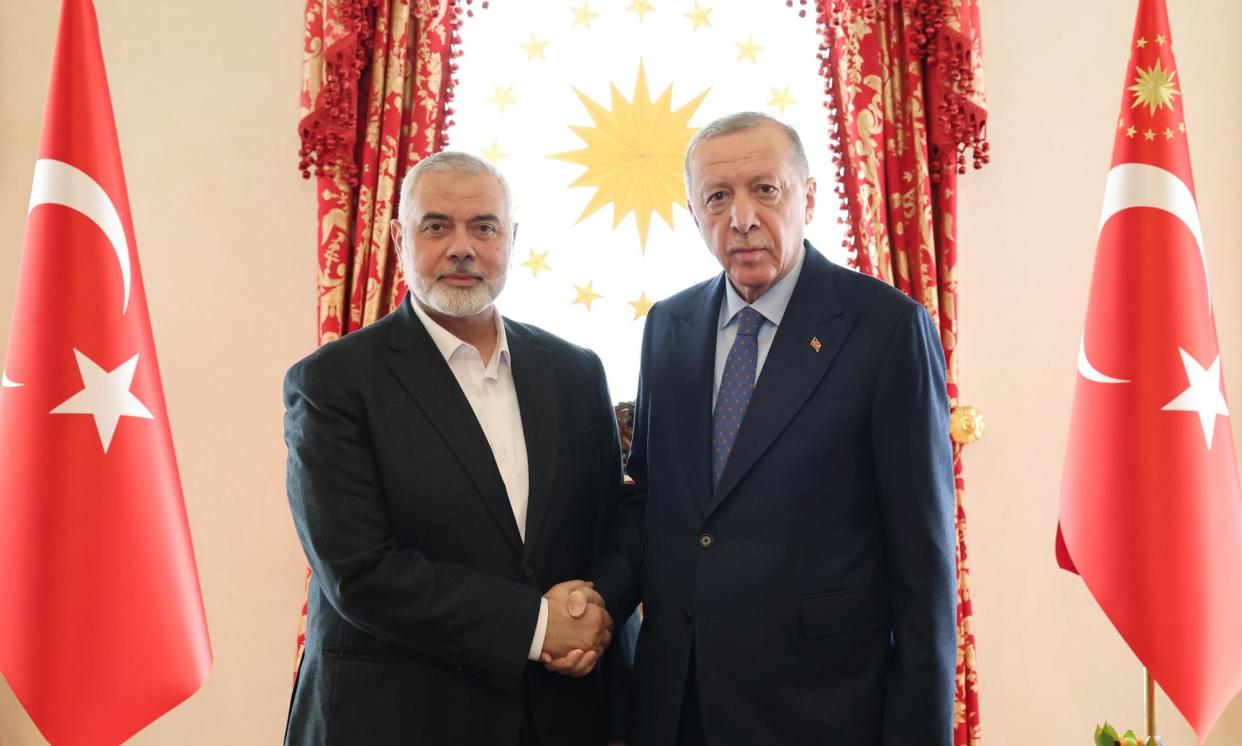Israel’s foreign minister says Erdoğan ‘should be ashamed’ of meeting with Hamas chief

Israel’s foreign minister has hit out at the Turkish president, Recep Tayyip Erdoğan, over his decision to publicise his latest meeting with the head of Hamas’s politburo.
Israel Katz shared a photo on X which showed Erdoğan shaking hands with Ismail Haniyeh at a presidential office in Istanbul over the weekend, writing that the Turkish president “should be ashamed”.
Erdoğan met Haniyeh alongside key members of his cabinet and Sameh Shoukry, the Egyptian foreign minister, to discuss Israeli attacks on Gaza and efforts to calm tensions across the region, according to the Turkish presidential office.
Erdoğan and Shoukry expressed concern during the meeting that recent drone attacks between Israel and Iran could divert international attention from suffering on the ground in Gaza, where 34,000 people have been killed by Israeli bombardments since 7 October.
The meeting also underscored a regional realignment taking place amid Israel’s attacks on Gaza after an unprecedented assault by Hamas on Israeli towns and kibbutzim in which 1,200 were killed and 250 were taken hostage.
Turkish relations with Israel have rapidly soured as Israel’s assault on Gaza has continued. Ankara recently opted to bar the export of 54 products including aluminium and cement to Israel until a ceasefire is achieved.
A flotilla of three ships carrying hundreds of activists, journalists and aid is due to leave Turkish waters in the coming days and sail to Gaza, reprising an identical effort from 2010. Israeli commandos eventually boarded the boats in international waters and shot dead nine of the activists, causing a years-long rift between the two countries.
Indirect ceasefire negotiations between Israel and Hamas that have been mediated by Qatar and Egypt appear to have sputtered if not collapsed entirely. The prime minister of Qatar, Sheikh Mohammed bin Abdulrahman Al Thani, said last week that Doha was re-evaluating its role as mediator, adding that some have used the talks for “narrow political interest”, and made “destructive”, statements about Qatar.
Benjamin Netanyahu, Israel’s prime minister, has said a date is set for a ground invasion of Gaza’s southernmost city of Rafah, prompting fears for the more than 1 million people sheltering there.
In a rare interview with Turkish state media Anadolu, Haniyeh called on “our brothers in Egypt, our brothers in Turkey, our brothers in Qatar as mediators and the European countries to take action to restrain [Israeli] aggression and prevent the operation in Rafah”, as well as the complete withdrawal of Israeli forces from Gaza.
Haniyeh also used the interview to lash out at Washington. “The US position is deceptive, even though it says it does not want civilians to be harmed, this is an attempt at manipulation,” he said, pointing to Israel’s use of US-made weaponry in Gaza.
Iran’s supreme leader, Ali Khamenei, thanked the country’s armed forces for their operation against Israel and urged them to “ceaselessly pursue military innovation and learn the enemy’s tactics”, Iran’s official news agency reported on Sunday.
Tehran openly targeted Israel for the first time on 13 April with more than 300 missiles and drones in what it said was retaliation for Israel’s deadly bombing of a consulate compound in Damascus, Syria, on 1 April.
“How many missiles were launched and how many of them hit their target is not the primary question, what really matters is that Iran demonstrated its willpower during that operation,” Khamenei said on Sunday.
Early on Friday, explosions echoed over the Iranian city of Isfahan in what sources said was an Israeli attack, but Tehran played down the incident and said it had no plans for retaliation – a response that appeared gauged towards averting region-wide war.
Reuters contributed to this report


